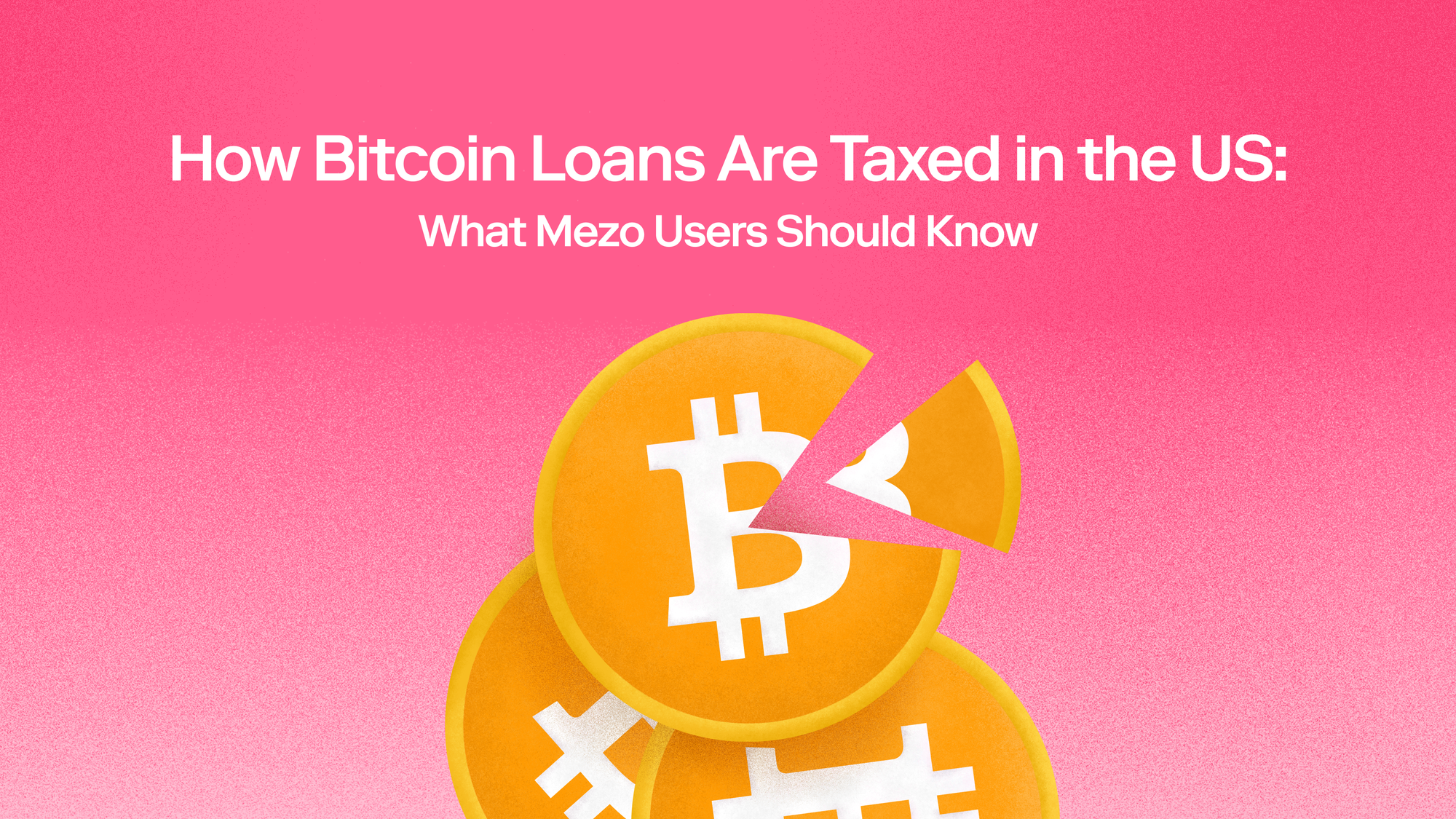How Bitcoin Loans Are Taxed in the US: What Mezo Users Should Know
Learn the US tax implications of Mezo Bitcoin loans: defer capital gains, deduct interest strategically, avoid costly liquidations. Complete guide to IRS treatment of BTC collateral, MUSD borrowing, redemptions & tax planning for Bitcoin-backed loans.

The primary appeal of a Bitcoin-backed loan through Mezo is tax deferral—not tax avoidance. While the initial act of borrowing MUSD against Bitcoin collateral is indeed a non-taxable event, this represents only the beginning of a nuanced tax journey.
Every subsequent move—from how you spend that MUSD to what happens during a liquidation—carries specific tax consequences that the IRS expects you to report correctly.
This guide breaks down exactly what triggers US taxes in the Mezo ecosystem, which interest payments you can actually deduct, and how to avoid the involuntary liquidation scenario that could saddle you with a massive short-term capital gains bill at the worst possible moment.
Bitcoin as Property Under U.S. Tax Law
The entire framework for understanding the tax implications of Mezo's Bitcoin-backed loans rests on a single, critical principle established by the IRS in Notice 2014-21: virtual currency, including Bitcoin and stablecoins like MUSD, is treated as property for federal tax purposes, not currency.
This classification, consistently reaffirmed through subsequent guidance and FAQs, means that general tax principles applicable to property transactions apply to every interaction with digital assets (IRS Digital Assets). This property designation creates a paradoxical situation for Mezo users.
On one hand, it enables the core benefit of the platform—pledging Bitcoin as collateral without triggering a taxable sale, similar to how investors use traditional Securities-Backed Lines of Credit. The borrower retains beneficial ownership of the collateral, bearing the economic risk of depreciation while maintaining exposure to potential appreciation. Since no disposition occurs at loan origination, no gain or loss is realized, and no immediate tax is due (IRS Topic 432).
On the other hand, this same property classification introduces tax friction throughout the loan's lifecycle. Actions that would be non-events if conducted with currency—such as paying interest or repaying principal—become potential taxable dispositions when executed with appreciated digital assets. Every time MUSD or Bitcoin changes hands, the tax code demands an accounting of basis, holding period, and gain or loss.
The Mezo Loan Lifecycle: Tax Implications
Loan Origination
When a Mezo user posts Bitcoin collateral and receives MUSD, the platform charges a 0.1% issuance fee in MUSD and adds a 200 MUSD gas deposit to the debt (Mezo Fees). Despite these fees, the fundamental tax treatment remains clear: borrowing is not income. The IRS explicitly states that loan proceeds aren't included in gross income because the borrower has an obligation to repay (IRS Topic 432).
From a practical perspective, this means a user who posts $100,000 worth of Bitcoin to borrow 70,000 MUSD (maintaining a healthy collateral ratio) has not triggered any taxable event. The basis in the borrowed MUSD is approximately $1 per token at the time of receipt, including any allocable fees—a figure that becomes crucial for calculating gains or losses on subsequent transactions.
Taxable Technicalties
Once MUSD is in hand, every use represents a potential taxable event. The IRS is unambiguous: using digital assets to pay for goods or services constitutes a disposition requiring gain or loss calculation (IRS Virtual Currency FAQs). When a Mezo user spends 5,000 MUSD on personal expenses, they must calculate the difference between the fair market value of what they received and their basis in those MUSD tokens.
Fortunately, since MUSD is designed to maintain a stable $1 value and the user's basis is approximately $1 per token, these transactions typically generate minimal gains or losses. However, the reporting requirement remains. Each transaction must be documented and potentially reported on Form 8949 and Schedule D, adding administrative complexity even when the tax impact is negligible.
Interest Payments
Mezo's interest rates are fixed at loan origination and accrue as simple interest, payable in MUSD.
Paying interest with MUSD constitutes a disposition of those tokens. While the gain or loss is typically minimal given MUSD's stable value, it's still a reportable transaction. More significantly, whether the interest expense itself is deductible depends entirely on how the borrowed MUSD was used—a determination made through the IRS's "tracing rules".
If the MUSD was used for personal expenses—paying bills, buying groceries, funding a vacation—the interest is personal interest and completely non-deductible. If used to purchase investments, the interest becomes investment interest expense, deductible only to the extent of net investment income and reported on Form 4952. Any excess carries forward to future years. Business use may allow deduction as business interest, subject to various limitations under IRC Section 163(j). The critical point is that the deductibility determination is based on the use of proceeds, not the nature of the collateral.
Redemptions
One of Mezo's unique features is its redemption mechanism, designed to maintain MUSD's dollar peg. Any user can redeem MUSD for BTC from the system. If your loan has one of the lower collateral ratios, the protocol may source some of your Bitcoin to fulfill the redemption, simultaneously reducing your MUSD debt (Read Mezo Liquidation Mechanics docs for more).
While this mechanism improves your collateral ratio and makes your position safer, it creates an involuntary taxable event. When the protocol transfers your Bitcoin to satisfy debt, you've disposed of that Bitcoin. The amount realized includes the debt discharged, and you must calculate capital gain or loss against the allocated basis of the Bitcoin transferred.
Consider a scenario where your loan has 10,000 MUSD in debt secured by Bitcoin worth $13,000 (a 130% collateral ratio). If a third party redeems 5,000 MUSD and the protocol sources $5,000 of your Bitcoin, you must report a Bitcoin sale with proceeds of $5,000. The gain or loss depends on your basis in the specific Bitcoin transferred, and the character (short-term or long-term) depends on how long you held that Bitcoin.
Liquidation
The greatest tax risk in the Mezo ecosystem occurs during liquidation. If your collateral ratio falls below 110%, the protocol liquidates your position, using your collateral to repay the debt and charging a 0.5% liquidation reward plus 200 MUSD to the liquidator. Check out the docs for more.
From a tax perspective, liquidation represents a forced sale of your entire Bitcoin collateral. You must recognize capital gain or loss on the full amount, calculated as the fair market value of the Bitcoin at liquidation minus your cost basis. The involuntary nature of this event removes any ability to time the market or manage your tax liability strategically.
This loss of control over timing can create particularly painful scenarios. Imagine holding Bitcoin with a cost basis of $20,000 that has appreciated to $60,000. A market crash triggers liquidation when you're already in a high-income year. You're forced to recognize a $40,000 gain—potentially short-term if held less than a year—adding substantially to your tax bill at the worst possible moment.
Strategic Considerations
Successfully navigating the tax implications of Mezo loans requires a proactive strategy rather than reactive compliance. The most critical element is maintaining conservative loan-to-value ratios. Over-collateralization provides a buffer against market volatility, reducing the risk of forced liquidation and preserving control over the timing of taxable events.
For loan servicing, using fiat currency or freshly purchased stablecoins eliminates the cascade of small taxable events that accompany using appreciated digital assets for payments. This approach simplifies record-keeping and preserves the core tax-deferral benefit of the loan structure.
Holding period management remains crucial. The difference between short-term rates (up to 37%) and long-term capital gains rates (typically 0%, 15%, or 20%) can dramatically impact the ultimate tax cost of any disposition. Understanding which specific lots of Bitcoin serve as collateral and their respective holding periods enables informed decision-making during market stress.
Perhaps most importantly, users must adopt a comprehensive approach to tax planning that accounts for both the deferred capital gains inherent in the loan structure and the immediate ordinary income from yield-generating activities. This dual-track taxation requires sophisticated planning and potentially professional guidance.
Don't wait until April to discover what you owe.
Start implementing these strategies today:
- Set up a dedicated spreadsheet to track every MUSD transaction with dates, amounts, and USD values.
- Configure alerts for when your LTV ratio approaches 125% to avoid surprise liquidations. Most critically, before your next interest payment, document exactly how you used your borrowed MUSD—this single step determines whether you can deduct thousands in interest expenses or lose that deduction entirely
The IRS is watching closer than ever with new Form 1099-DA reporting, and the difference between proper planning now and scrambling later could save you from both massive tax bills and potential penalties. Take 30 minutes this week to review your Mezo positions through a tax lens!
Frequently Asked Questions (FAQs)
What is a bitcoin interest rate?
It's the percentage cost you pay to borrow funds against your BTC collateral, or the Annual Percentage Yield (APY) you can earn interest on by lending BTC. Mezo focuses on providing low, fixed borrowing rates for ultimate predictability.
Can I earn interest on Bitcoin with Mezo?
Yes. Beyond borrowing, the Mezo ecosystem is designed with vaults and rewards structures that allow you to earn interest on your assets, all while maintaining the security of self-custody.
How does Mezo set its bitcoin interest rates?
Our rates are determined by a combination of factors managed entirely on-chain: protocol governance, the level of overcollateralization, and overall market conditions. The process is fully transparent.
Are Mezo's rates fixed or variable?
Mezo specializes in fixed-rate loans. We believe borrowers deserve clarity and confidence, which is why we eliminate the uncertainty of variable rates.
What happens if the price of Bitcoin drops?
Your loan’s health is measured by its loan-to-value (LTV) ratio, which is monitored constantly by smart contracts. If your LTV ratio crosses a certain liquidation threshold, a portion of your BTC collateral may be automatically sold to repay a portion of your loan, protecting both you from further debt and the protocol from risk. You can always add more collateral to avoid this.
Is my loan protected by smart contracts?
Absolutely. The entire lifecycle of your loan—from origination to repayment and collateral release—is managed by fully audited, open-source smart contracts.
How do I get my Bitcoin back after borrowing?
Simply repay your MUSD loan balance. Once the loan is repaid, your BTC collateral is automatically and instantly released back to your control. No manual approvals, no waiting periods, and no hidden fees.
Let's build the circular Bitcoin economy. Follow @MezoNetwork
🏦 Start borrowing • 📚 Read the docs • 💬 Join Discord • 🛡 View audits
